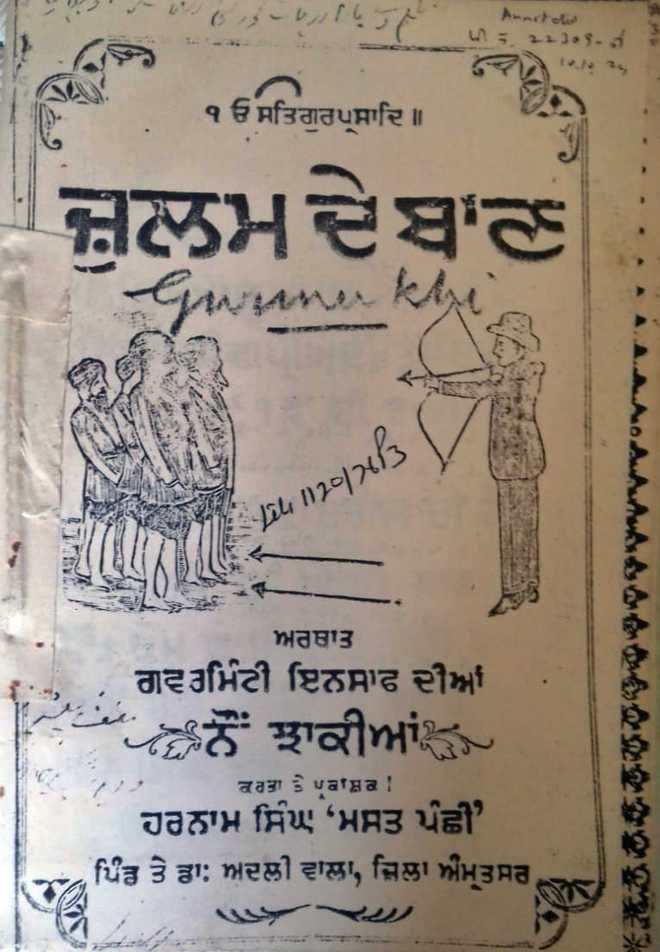Vishav Bharti
Tribune News Service
Amritsar, April 3
Nadir Shahi vi Hind nu bhul gayi e, Chale Englishi aise furman aithe
Karan kehde aakhran vich zahir, Jo-jo zulam de hoye samaan aithe
(Even Nadir Shah is forgotten, so ran the English wrath here How do I express the acts of oppression inflicted here)
Feroz Din ‘Sharaf’ was trying to put words to the Jallianwala Bagh massacre. The celebrated poet, fondly known as the “bulbul” of Punjab, however, had no clue that he was under watch of the British Empire.
On May 26, 1924, the Punjab government banned his anthology, Dukhan De Keerne (Wails of Pain).
But by then, a new kind of resistance had emerged, with Punjabi poetry themed on the massacre becoming an inspiration for the struggle against colonial rule, says Mohali-based historian Dr Gurdev Singh Sidhu, who is known for his seminal work on banned literature during the colonial rule.
Dr Sidhu says after the massacre, every year on April 13, a “kavi darbar” used to be organised at Jallianwala Bagh and poems would be prepared in advance and later published in small pamphlets.
Though it was on May 19, 1920, that Punjab’s Director Public Instructions sent a report to the state’s home secretary warning him about how some Punjabi poets were seeking inspiration in the contemporary political agitation, the banning and confiscation of literature started only two years later when the Akali Movement emerged.
The British government banned seven books of poetry in Punjabi alone. “The first book to be banned on December 6, 1922, was Harnam Singh’s Akali Goonj. The defiance of Sikhs, who were considered faithful, shocked the British administration. Jallianwala Bagh became the biggest metaphor of hate against the empire. So, they started banning each and every work having any reference to 1919,” says Dr Sidhu.
Though the complete list of confiscated and banned literature is not available, as per a rough estimate, 100 to 125 such literary works are lying at the National Archives in Delhi, the India Office Library and the British Museum in London.
‘Publications proscribed by the Government of India’, a book edited by Graham Shaw and Mary Lloyd and published by British Library, reveals that the Punjabi books banned during the era included Harnam Singh’s Akali Goonj (Akali Cry); Sant Suraj Singh’s Jagriti Khalsa (Awakening Khalsa); Gyani Maan Singh Ferozepuri’s Taaze Zakham Yaani Guru Ka Baag Ka Nazara (Fresh Wounds: The Scene of Guru Ka Bagh); Vidhata Singh Tir’s Tir Tarang (Arrows of Fancy); Zulam De Baan
(The Arrows of Oppression) by Harnam Singh ‘Mast Panch-chi’ and Tarana Mazloom (Song of the Oppressed) by an unknown writer.
Not only Punjabi, even works in Urdu and Hindi were not spared for portraying the massacre across the country. In Urdu, a three-act play, Zakhmi Punjab, was banned. In Hindi, Ram Savrup Gupta’s Bage Jilyan, Jagan Nath Prasad Gupta’s poems and Kanhaiya Lal’s Bahrityon ki Chetavani were also banned.
Besides that, nationalistic songs like “Mahatma Gandhi ki Jai” and songs by Lala Ratan Lal and Jagdish Prasad Tiwari were also targeted.
Chandigarh-based publisher Harish Jain says the archival material reveals that poets started using Punjab instead of Jallianwala Bagh to evade the colonial wrath.
‘Khooni Visakhi’ by Nanak Singh
‘Khooni Visakhi’ by Nanak Singh was published in 1920 and is believed to have been banned soon after. It remained in oblivion for six decades before it was re-published in 1980 by the novelist’s publisher son, Kulwant Singh Suri. “Giani Zail Singh was a great admirer of my father’s work. I requested him to arrange a copy and it was sent to us,” recalls Amritsar-based Suri. Now, on the centenary of the massacre, the novelist’s diplomat grandson Navdeep Suri has translated it into English. However, historian Dr GS Sidhu says despite his best efforts, he has not been able to find any notification regarding banning of the book, as in other cases.
Tomorrow
The ‘evil Cottonian’
Unlock Exclusive Insights with The Tribune Premium
Take your experience further with Premium access.
Thought-provoking Opinions, Expert Analysis, In-depth Insights and other Member Only Benefits
Already a Member? Sign In Now










